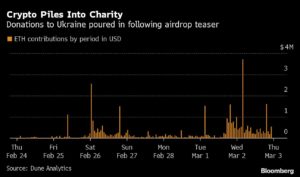Donations to the Ukrainian authorities and related charitable organizations are skyrocketing because the combating has intensified in opposition to invading Russian forces. Cryptocurrencies have figured conspicuously within the effort, billed as a brand new and welcome useful resource for the nation in a time of disaster. However Ukraine’s journey into the cryptoverse has had its bumps, serving as a lot of a cautionary story as an inspiration.

The Ukrainian authorities has established a number of digital wallets to obtain donations in a wide range of cryptocurrencies from Bitcoin to Dogecoin, whereas different non-governmental our bodies even have their very own wallets to obtain donations for the nation’s armed forces. The method of monitoring simply how a lot has been donated is hard, although, regardless of crypto’s professed clear nature. Bloomberg verified greater than $28.5 million in donations to Ukraine’s authorities as of Thursday morning, however different sources resembling blockchain analytics agency Elliptic places the overall nearer to $43 million. The quantity is however a drop within the ocean, nevertheless, with Ukraine’s 2021 protection funds estimated at $4 billion.
To these on the bottom, help is significant it doesn’t matter what kind it is available in. For some Ukrainians overseas, crypto is the place they really feel they will contribute probably the most to assist the battle of their homeland. And Ukraine’s success in elevating cash and commanding the eye of crypto’s plenty has been nothing to smell at. However the course of hasn’t been with out snarls: Ministers and donors alike have needed to navigate a variety of pitfalls together with a failed venture, a scarcity of spending energy and rampant scams.
A few of its concepts have been good in idea, if not a little bit unorthodox. A promise by the Ukrainian authorities on Wednesday to reward crypto donors with a so-called “airdrop” — a course of the place early backers are given free tokens to assist bounce begin a venture — noticed donations to its affiliated crypto addresses soar. Individuals rushed to half with their tokens forward of a cutoff level at which a report could be taken of the donations made up to now, successfully gamifying the humanitarian push by inviting in those that might make a fast buck off the ensuing rewards.

However the airdrop was canceled a day later, following a spoof rip-off during which the federal government’s Ethereum handle gave the impression to be distributing reward tokens to particular person crypto addresses hours forward of schedule. Jess Symington, analysis lead at Elliptic, stated the hacker had despatched 7 billion newly minted tokens to Ukraine’s Ethereum handle that contained a permission permitting them to regulate the tokens from whichever pockets acquired them — that means that any tokens then despatched from the Ukraine handle would convincingly seem to have been transferred by the federal government itself.
The airdrop incident is just one instance of how the state’s use of cryptocurrencies has resulted in an uptick in scams through the fundraising course of, as extremely adept digital attackers goal folks’s goodwill in searching for to do what they will to assist the trigger.
“The key peril that we’re seeing is simply an unbelievable variety of scams,” Symington stated in an interview. “We’re seeing folks screenshot Ukrainian authorities tweets with the addresses and simply photoshop on their very own addresses. We’re seeing folks say, ‘I’m elevating cash, right here’s my handle’, and it’s clearly their private handle. We’re simply seeing an enormous variety of scams.”
Except for the figures, details about how the Ukrainian authorities spends the crypto it has acquired has been extraordinarily restricted, their fingers tied by the restricted variety of methods it could possibly make the most of the tokens for assist. Donations acquired to its Ethereum handle have largely been transferred to an area crypto alternate for conversion into fiat forex, whereas non-governmental crypto organizations established to garner further funds are sitting on piles of tokens with few methods to redistribute them.
Assist for Ukraine, a Ukrainian government-affiliated decentralized autonomous group arrange by native web3 agency Everstake and Solana co-founder Anatoly Yakovenko, stated it has partnered with crypto alternate FTX in a bid to ease the method of disseminating crypto donations. Everstake Chief Govt Sergey Vasylchuk stated the venture can be working with the Ukrainian central financial institution to develop a bridge that may enable the financial institution to straight convert cryptoassets raised by the DAO for presidency use.
“Not everyone seems to be prepared to or can cope with crypto,” Vasylchuk stated in an interview on Wednesday. “Shopping for like two or ten night-vision goggles is nothing, however as a way to do one thing severe prices severe cash. That’s why we have to construct this limitless gateway to assist.”
After all, a few of these points are a luxurious that solely these not residing in a struggle zone have time to ponder. Vasylchuk flew to Florida two days earlier than Russia’s full-scale invasion started, however his dad and mom and siblings stay in Ukraine. In a tearful dialog, he highlighted what may be crucial factor for outsiders to recollect: On the finish of the day, glitches and a scarcity of readability round crypto donations and the way they may be used is unimportant within the context of warfare, bombed properties and households squatting in underground bunkers.
“You can’t be so calm, you can’t take into consideration the transparency or concerning the correct use of those funds. Proper now we’d like to withstand,” he stated. “It’s only a query of survival.”
For certain, the Ukrainian state’s strategy has been a masterclass in what a digital-first, crypto-native technique can do for a rustic in its time of want. But it surely’s additionally a lesson in what issues the crypto ecosystem nonetheless has to resolve earlier than it could possibly turn out to be the worldwide funds savior its adherents say it’s destined to be.
–By Emily Nicolle with help from Vildana Hajric and Akayla Gardner (Bloomberg Mercury)